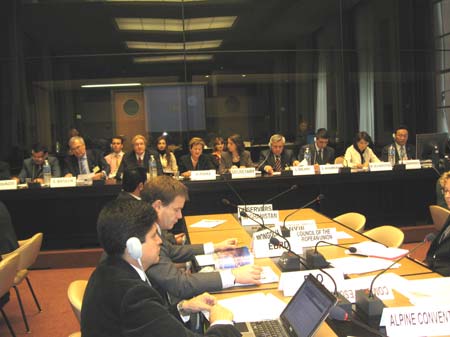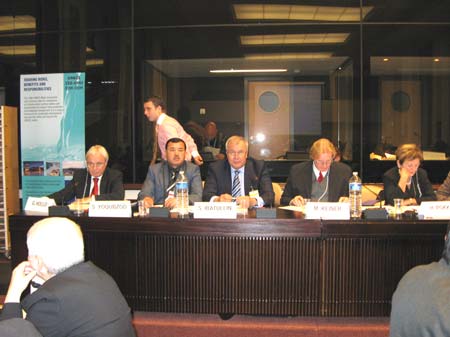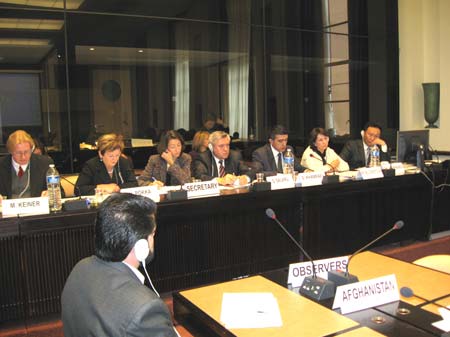ICWC'S REPRESENTATIVES PARTICIPATION ON THE FIFTH SESSION OF THE MEETING OF THE PARTIES OF THE CONVENTION ON THE PROTECTION AND USE OF TRANSBOUNDARY WATERCOURSES AND INTERNATIONAL LAKES
Representatives of all countries - ICWC's members - had opportunity to participate on the fifth session of the Meeting of the Parties of the Convention by invitation of UNECE convention secretariat. The following persons took part on the meeting:
M. Tultabaev, Ministry of Environment; Kazakhstan;
Ch. Uzakbaeb, Water Department, Ministry of Agriculture, Water Management and Processing Industries; T. Neronova, State Agency for Environmental Protection and Forestry, Kyrgyzstan;
Saidi Yoqubzod, Ministry of Melioration and Water Resources; N. Amanov, Republic Committee on Environmental Protection; Tajikistan;
Shavkat Khamraev, Ministry of Agriculture and Water Resources; Nariman Umarov, State Committee for Nature Protection; Uzbekistan.

Unfortunately a representative of Turkmenistan did not arrived as well as a chairman of Committee on Water Resources from Kazakhstan who was indicated in the participants' list. Moreover the following people participated: From the regional bodies: Saghit Ibatullin, Executive Committee of the International Fund for saving the Aral Sea; Victor Dukhovny, Scientific Information Center, Interstate Commission for Water Coordination of Central Asia; From NGOs: Yusup Kamalov, “Board of Aral protection”; I. Chistyakova, CARNet; G. Djamalova, REC CA.
Mr. Moritz Leunberger , Vice-chairman of the Federal office on environment of Switzerland, has presented a wide assessment of governmental attitude to water situation in the country, Europe and in the World in his greeting. The Government is greatly concerned by water stress increasing and is doing efforts to mitigate this aggravation especially in connection with climate change. One of such regions is Central Asia where up to 2080 the temperature is expected to rise up to 4 degrees of centigrade and where the Switzerland intends to continue its support on adaptation to this dynamics by the monitoring strengthening and IWRM implementation. “Water is not responsible for climate change, but water crisis is increasing as far as climate is changing”. Switzerland is preparing for the Ministerial Conference "Environment for Europe" which will be held in Astana in 2011 under slogan "Sustainable Development for Water and Water Related Ecosystems".


The delegation of Uzbekistan had welcomed participants of the session, had thanked the secretariat and Government of Switzerland for organizing of this event and for hard work on the Convention transforming into efficient mechanism of shared transboundary water management. Mr. Khamraev Sh.R. noted that Uzbekistan had acceded to both conventions (1992 and 1997) and called on neighboring countries to do the same notably to accede these important documents on international water law.
The session's program was aimed on both to summarize previous action plan and to develop a plan of measures within the proposed activity development on 2010-2012 and further.
Adoption of the Guide to Implementing the Convention was the most important among other issues. Ahead of the conference Uzbekistan had introduced a number of remarks aiming to hardening of the International Water Law that could improve a guarantee of water availability for water users in the basin. Mr. Khamraev Sh.R. and Prof. Dukhovny V.A. have presented their remarks on the basis of analysis of the situation in the Syrdarya basin in 2008-2009. These remarks are as follows:
- need to focus in the Guide on the rules of actions regarding quality and natural requirements for rivers firstly of the flow regime meaning exclusion of unauthorized actions resulting in damages and losses of bordering countries;
- to determine clearly margins of sovereignty within basin meaning a need to coordinate all actions not only along the river but also on the whole catchment’s area;
- need of the detailed recommendations on application of such main rules of the Convention as "reliable and equitable use", "non prejudice", "a limited sovereignty" and their interconnection.
The proposal of Uzbekistan was marked by Chairman of the Law Council in his final generalized report and also was included in resolution in which the Law Council was recommended to continue work on improving the Guide in consideration of comments and evaluation of critical situations on our rivers.
During discussion the representative of Afghanistan reported about absence of country's policy on transboundary waters though the National Water Council was established and new ecological law was adopted. He emphasized that downstream countries are increasing their water potential that can lead to future conflict. Afghanistan intends to join to the Convention and has started procedures through diplomatic channels. The country needs very much the information exchange, trainings and knowledge about modern experience in irrigated farming.
During discussion of water resources monitoring, Mr. Umarov N., Chairman of the State Committee on Environment of Uzbekistan, had noted importance of data exchange about water quality between riparian countries and various agencies, and suggested to develop mechanism of interagency and transboundary barriers overcoming.
Mr. Uzakbaev Ch., Deputy director of Water Resources Department of Kyrgyzstan, had reported about country's experience on national dialogue about sectoral policy of financing water supply in the country that provided the strategy to ensure achievement of MDGs.
Special High-level Segment on Transboundary water cooperation in Central Asia had discussed situation and further development of collaborative works with consideration of works connected with the Convention. Mr. Ibatulin S., Chairman of EC IFAS, reported about work directions, which are being considered by countries-participants and regional bodies for implementation of Statement of Heads of State of 28 April 2009 and will be considered by EC IFAS at the nearest time and presented to country's leaders for approval.
Mr. Saidi Yoqubzod, Minister of Melioration and Water Resources of Tajikistan, had emphasized the water distribution unevenness in the region: 80% of water resources are originated in Tajikistan and Kyrgyzstan, but 85% of water resources are used by downstream countries. Water problems are aggravated by climate change and at the same time they exert an impact on socio-economic situation in the region. The problems solving is possible on the basis of water saving in the irrigation (where losses are 40%) and more rapid development of the hydropower engineering potential. The last will allow increasing not only electricity production but also sustainability of water delivery for irrigated agriculture. He called on to shift from words to concrete dialogue including participation of other countries in the waterworks construction.
Mr. Shavkat Khamraev , Deputy Minister of Agriculture and Water Resources of Uzbekistan, reported that some interaction is between national and regional bodies that requires special attention regarding to determination of releases regime The current situation when holders of HES press the unauthorized releases regime, is very dangerous both for irrigated agriculture and for Nature. The compulsory tight rules for flow regulation by reservoirs are needed. Rules when nobody can feel herself as a holder of river should be laid down. The consensus is to be found because growth of disagreements generates conflicts Uzbekistan, being adhered to the Convention, fulfils all commitments on support of cooperation and regional bodies. We think that it is a time to start development of the strategic plan on transboundary basins development.
Deputy Director of the Water Department of Kyrgyzstan stated that after collapse of the USSR some bilateral and multilateral agreements were concluded in order to keep previous bodies - BWOs. Now neither ICWC nor BWOs play any vital role. He concluded that these bodies are to be reorganized because they have no enough authorities to resolve any disagreements and conflicts. He told that the most successful case of bilateral cooperation is the Chu-Talas Commission activity. Prof. Dukhovny had disagreed with that position. He told that this speaker likely forgot about the revised ICWC Status which was developed by the Work Group over the period of 2 years and adopted at the last ICWC meeting under the chairmanship of Mr. Koshmatov, Vice Director of the Water Department of Kyrgyzstan.
The representative of Afghanistan had raised a question about participation of his country in the negotiation process on the Amudarya River and suggested to keep them in mind as to all measures in the region.
Mr. Klimchuk, representative of newly established UN Center on Preventive Diplomacy, had informed about Center’s work plan on strengthening cooperation in the region.
Mr. Umarov N. had concentrated attention on climate change and its impact on situation in Priaralie. The strong warning for neighbors about uncoordinated actions on transboundary water bodies which aggravate the existing situation especially in the Amudarya basin was given in his report. He also called on to ratify Conventions and to implement their positions. Using own position as ICSD's Chairman, he informed participants about intention to give new impulse to the regional ecological cooperation by creation of unified system of ecological monitoring and by revising the indicators of nature state.
The representative of Kazakhstan had expressed also concern about melting of glaciers and made unexpected allegation about possibility to save 70 billions cubic meters of water in irrigation.
Mrs. Neronova T. informed about situation with glaciers in Kyrgyzstan and gave the warning prognosis about their possible disappearance to 2050. Special National Committee on adaptation to climate change was established in the Republic.
Prof. Dukhovny had demonstrated ICWC's measures on strengthening of cooperation between countries: dialogue between national and regional teams, development of regional information system, organizing the unified regional training system, arrangement of works on regional projects for water use improvement.
Collaborative work must be based on free information about river runoff use provided by ICWC but not on the newspaper or dilettante speculations like the statement of Kazakh representativeIf he looked at the real data, he could be sure that countries of the region used 88 billion cubic meters of water for irrigation of 78 million hectares of lands in 2007 or a little more 11 thousand cubic meters of water per hectare. But in the dry 2008 aggravated by activity of Kyrgyz power engineers, when irrigated fields of 4 countries received 60% of planned water at 75% of the natural water content, 70 billion cubic meters were delivered for irrigation in the basin.
Yusup Kamalov, Chairman of the Union for the Defense of the Aral Sea and Priaralie on behalf of non-governmental organizations had informed about situation in this region where million tons of dust from dried sea bed create additional load for climate. These phenomena are beyond attention because there is no any project that is aimed to save the Sea and to reduce consequences of its drying. He was against rivers use by upstream countries as runoff ditches and suggested to use the economical mechanisms on the basis of principle "a polluter must pay".
At the closing part of the meeting, parties considered and adopted resolutions about efforts of Secretariat for last three years, the work plan on the follow-up period and the plan for financing.
The work meetings were held. Particularly, the Ministry of Environment of France suggested its assistance for improvement of ICWC information system for Syrdarya River.
|